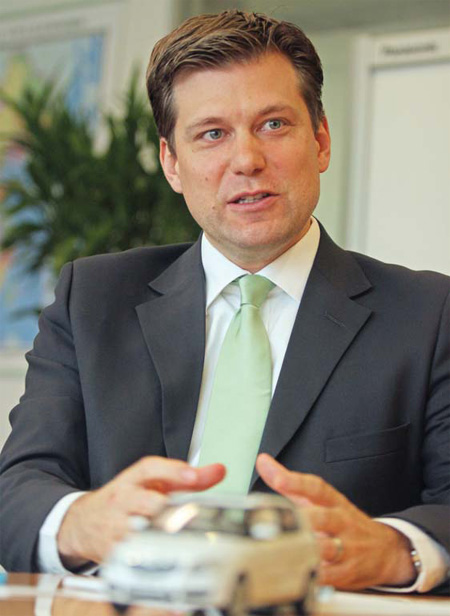Skoda counts on China for success
Updated: 2011-11-25 08:51
By Andrew Moody (China Daily)
|
|||||||||
|
Skoda's Gerrit Marx says he wants to double market share. Liu Zhe / China Daily |
One of world's oldest carmakers leads central, eastern european investment in the country
Gerrit Marx, the 36-year-old new president of Skoda in China, says the world's second-largest economy is vital to the company's success.
The car company, which is a leading example of Central and Eastern European investment in China, is expected to achieve sales of more than 200,000 in China this year, more than in any other market in the world. It also aims to double its current market share in China of just below 2 percent.
"In recent years, China has become the hot spot of the auto industry. We have a global strategy of doubling sales worldwide by 2018," he says.
"We aim here, however, to double our market share but that is more than doubling sales because the market is growing so fast," he says.
Marx, who took up his current position in July having previously been president and CEO of Daimler Trucks in China, is in confident mood in his Volkwagen Group China offices at Sanlitun in Beijing.
Despite himself being German, he says Skoda still has very much the look and feel of a Czech company.
Skoda, which was founded in 1895 by Vaclav Laurin and Vaclav Klement, is one of the oldest car companies in the world.
It has been selling cars to China for 75 years and famously gifted Chairman Mao a bullet-proof limousine which can now be seen in the Military Museum in Beijing.
The company, which is based in Mlada Boleslav near Prague, began manufacturing cars in China for the first time in 2007 when it started rolling out the Octavia.
The latest of five models to be made here will be the compact SUV Yeti, due to start production in 2013.
Marx says there are many myths about the China market, including that it is an easy market to sell in because of its fast-growing momentum.
"It is incredibly competitive, every American brand is here, every European brand and every Japanese brand. I don't want to use Frank Sinatra words here but if you can make it here, you can make it anywhere," he says.
He says having a market share of 2 percent would be seen as a failure in any other market than in China.
"Having a 2 percent share in Europe would be regarded as an extremely weak position and certainly measures would be called upon to improve. Here selling 200,000 cars within five years is something truly unique. There are more than 80 brands in China, counting the local brands," he says.
Although Skoda became part of Volkswagen in 1991 and operates in China as partner of Shanghai Volkswagen (the joint venture between Volkswagen Group and Shanghai Automotive Industry Corporation), Marx says the company sees itself very much as an ambassador for the Czech Republic. It recently sponsored an art exhibition at the Czech embassy in Beijing.
"We do feel committed from the bottom of our hearts to further tighten and develop the relationship (between the Czech Republic and China) and to bring forward Czech culture into China as well as its products and brands," he says.
Marx welcomes ideas to foster trade and investment links between the two countries, as evidenced by it partnering the China Investment Forum in Prague this month.
Marx began his career with management consultants McKinsey & Co, specializing in the auto sector and working all over the world, including Brazil, India and Japan.
Marx joined Daimler in 2007 and moved to China two years later to head Daimler Trucks.
He says one of the exciting aspects of the China market is the growing middle class and with millions of people reaching the position where they can afford a car between 8,000 and 10,000 euros.
Skoda's entry model, the Fabia, is neatly positioned at a list price of 78,000 yuan ($12,260, 9,118 euros) to capture a chunk of that market. Skoda's other models are also positioned on the borders of other segments so they will benefit from rising incomes across its range.
"When a society is moving upwards in its development, once the purchasing power reaches a sufficient level, that is the sweet spot.
"We feel very certain and confident about our positioning and we are extremely happy about the success we have in this market," he says.
Skoda is seen as a brand with a strong growth rate and its recent strategy has involved concentrating on markets such as Russia and India as well as China.
"An emerging market is not only growing but as it develops a certain proportion of the society is moving into a higher income level," he says.
Skoda is absent from arguably the most developed car market, the United States, where it neither manufactures nor sells cars.
"Skoda is not present in the United States. Volkswagen is perfectly positioned there and has just opened its Chattanooga plant in Tennessee which is state-of-the-art in every way," says Marx.
Skoda makes five models in China at manufacturing bases in and around Shanghai, which are owned by the joint venture.
There are no dedicated Skoda manufacturing workers and those on the assembly lines switch between making Volkswagen and Skoda cars. Marx says this is one of the key differences between manufacturing in China and in the Czech Republic. "There is one team and we play as a team. We do not duplicate structures. We are one highly-synergized integrated structure," he says.
"There are certain staff who are dedicated to Skoda but when it comes to production our assembly line colleagues produce both Skoda and Volkswagens on the same line."
Although labor costs remain cheaper than in the Czech Republic, which has some of the lowest wage rates in the European Union, the differential is no longer that great.
With pay rates in China rising all the time, Marx says the days when a car company would move to China to benefit primarily from lower unit labor costs are well and truly over.
"The average salaries in Beijing, Shanghai and Guangdong are now rising at high single, or double, digits every year," he says.
"When you are looking for extremely skilled staff, senior managers and plant managers, you find you have to pay the same or even higher levels than in Europe."
Marx says that relocating outside of China in another location in Southeast Asia to supply the China market is just not an option.
"There is no plan and I could think of no reason why that would make sense. Once a car manufacturer is in China it is here to stay so as to further develop its partnership and relationships," he says.
"Skoda wouldn't be where it is today without Shanghai Volkswagen and without the joint venture with its Chinese partner. That is very clear," he says.
Marx says China is a very sophisticated market and that it is important to reach customers in sophisticated ways, including getting the brand known among the country's millions of netizens.
"One of the things that was new to me and I first noticed when I came on a business trip prior to arriving in China was the number of netizens here. It is a very important online community that has very clear and distinct opinions about brands and products," he says.
These netizens will be part of Marx's armory in his mission to double his market share in China.
"We are putting the things in place so that we will achieve this. We never go primarily after volume, however. We go after the best car concerning spaciousness, functionality and price value as well as to have the best quality in each of our segments of the market. We always put customers' needs first," he says.











